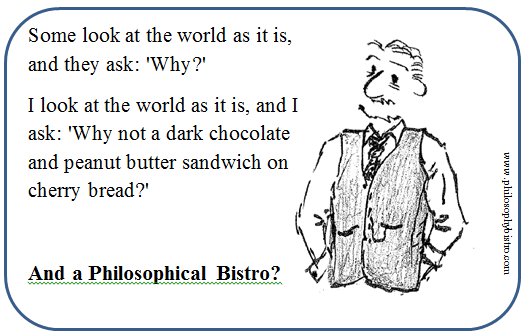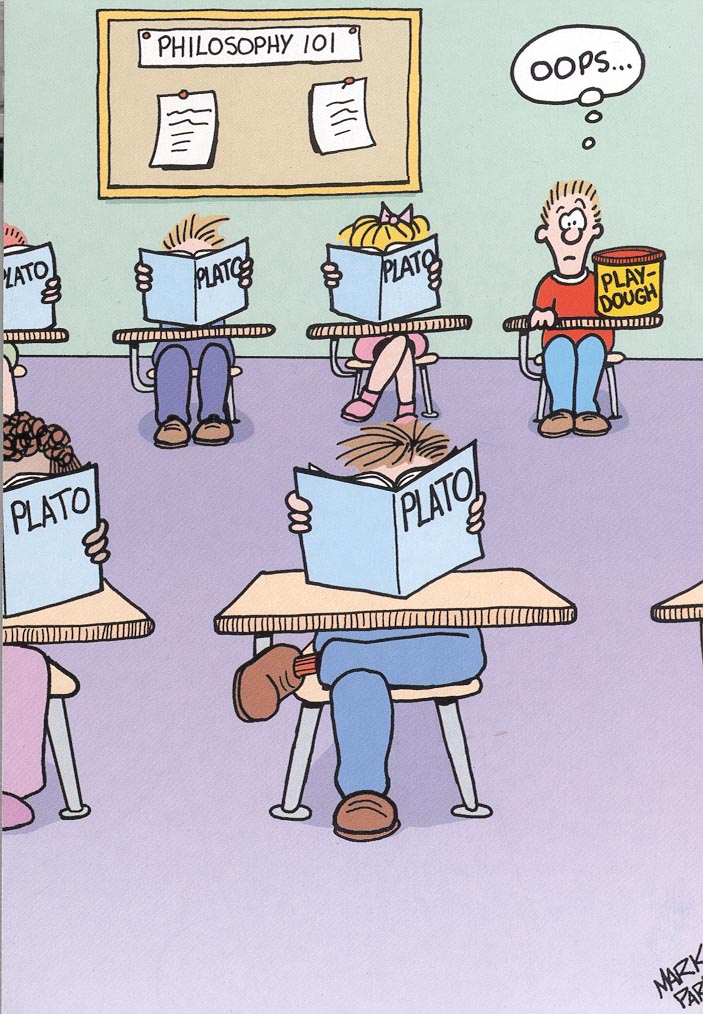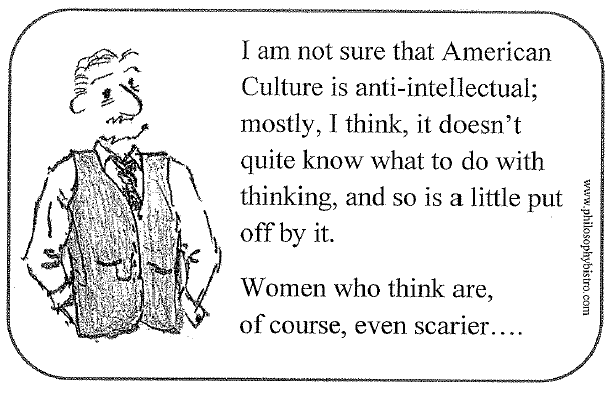My first week here at the Philosophy Bistro has gone well. I get my meals free, the witticisms are frequently both complimentary and complementary, and whenever someone complains about my service, they at least start off by saying, “Bless his heart.” My only concern is that Wode Toad was in charge of my orientation, and I have not always found his instructions easy to follow. For example, he spent about fifteen minutes explaining that I must starch my shirts so that their collars are “stiff” without being “rigid,” and I have found this a fine line to tightrope across. Still I try my best, in part because I love the work, and in part because I can tell that the management is generally beneficent even when inscrutable.
“What have I told you about overdoing the chlorine?”
I cover all of my first week at the bistro in more detail in my epic “Ode on a Wode Toad,” but this is not yet ready for publication. (I made the mistake of writing the first draft in Gaelic, a language that I know mainly from Scrooge McDuck cartoons, and this has complicated my translation efforts.) Rather than drilling down further into my own experience, however, the way an artist might, I would like to step back and abstract from that experience as a Philosopher would. As an aid to this abstraction, let’s consider another case.
A good friend – we will call him “Rosebud” – recently told me he had called a meeting with another manager at his workplace for the first time in several months. For a long time they met regularly, at Rosebud’s invitation, but during the crunch period of a major, year-long project he ceased to find the time. Now that things had settled down he wanted to check in again, but the other manager’s first response had been to ask in a worried tone what the meeting was about. As we talked further, I began to see that these two probably had divergent expectations about their session. Rosebud understood that he had taken the responsibility earlier for establishing a good relationship with his co-worker, he had gotten too busy to keep meeting with her, she had not taken steps to continue those meetings, and their work together had suffered some as a result. He wanted to clear the air without blaming anyone, while inviting both of them to do better in the future. The other manager, I sensed, might have taken for granted Rosebud’s early initiative to bring them together, felt ignored or abandoned when he stopped calling meetings, and decided that if there was any blame to go around, it should not go to her. This was only a guess on my part, but it seemed a good way to make sense of Rosebud’s story. When it came time for me to offer advice, I made two suggestions: (1) Forget the past and just focus on the future, and (2) Stress the positive, including giving any praise that you sincerely can. Rosebud understood how the first suggestion could reduce defensiveness and avoid the kind of deep processing that he appreciates but his co-worker might now. And he generally agreed with the second suggestion too, but worried that it would be manipulative.
Since this discussion I’ve thought a lot about management and manipulation. In my own years managing people I never really reached a settled position on this topic. In part, I blame Immanuel Kant.
Everything you say seems more erudite when you’re wearing a powdered wig.
Kant, you see, is almost without question the leading ethical thinker in the Western Philosophical tradition, certainly as judged by his reputation among contemporary Philosophers. He is the leading theorist of autonomy – the right of each individual to make their own informed decisions – and so the arch-enemy of even the most well-meaning manipulation. You must never, according to Kant, use other people as a means to your own ends, but must instead engage with respect for their innate ability to decide their own goals. Over the decade I spent in college and graduate school, I can recall only a few ethical debates where Kantian arguments did not play a significant part, and only slightly fewer where Kant did not have the last say. Individual autonomy is essential our overwhelmingly liberal culture. (I mean “liberal” in a slightly broader sense than it’s usually used, and that’s a discussion that will have to wait for another day.) And I grew to appreciate and largely adopt this position for my own. I made something like a vow to myself that I would always try to treat people as ends-in-themselves, to avoid manipulating them, even in a sincere effort to help them, and instead to give them the information they need to make their own decisions.
And then I started managing people. And then I became a (step-)parent. And I wonder what Kant would have made of either experience. I certainly don’t think there will ever be a Kantian Guide for Raising Autonomous Children, and we have yet to see a book with a title like Kantian Leadership in the Boardroom. The latter is surprising, because the still burgeoning world of business books keeps churning out management guides based on the lives of considerably less admirable figures, Attila the Hun and Genghis Khan among them. (For those in a rush, here is a brief summary of the lessons from Genghis Khan’s career: gather the nomads, make sure you’ve invented stirrups so that they can fire their arrows forward or backward while riding at a full gallop, and avoid southern China like the plague, because that’s where the plague comes from. Also, if you see someone with either of these books on their desk, walk away.) There have even been books that draw on other ethical thinkers. But Kant just does not lend himself well to such application.
It took me a while to figure out why. And while managing adults helped me learn this lesson, it’s been helping raise young twin daughters that has really let me understand: before people can hear you, they have to trust you. Kant, like most Philosophers, treats language as it consisted mainly of statements exchanged between people dispassionately contemplating the world. But that is not usually so. Take the sentence, “You could have done that better.” We can analyze its truth conditions and find that it is almost surely true. You – whoever you are – could almost surely have done that – whatever it is – better by some reasonable standard. This is the typical way Philosophers study language. But it’s not how most people, including Philosophers, actually use language most of the time. If someone you trust tells you that you could have done better, you know they have your best interests at heart and think it’s important for you to be encouraged to improve. (I make variations of this statement to my step-daughters almost daily, and increasingly they say it back.) By comparison, if someone you’ve come to see as your enemy says the same thing, you’re more likely to think they are trying to undermine you. And you may be right.
People warned me when I first began managing some of my fellow faculty members that all of my professional relationships would change. I didn’t believe them. Or rather, I believed that that could happen, but I thought it all depended on how I carried myself. If I still treated people the same way, we would have the same relationship. But that wasn’t true. The same words had different meaning when they came from “the boss.” I anticipated that I would have to stop making fun of my close friends, and that they would probably make fun of me less, at least when I was around. But I didn’t get that everything I said and didn’t say would be scrutinized for possible threats. I didn’t realize that the (honestly, rather limited) power I had in this new position meant that people I had known for years were going to have to learn to trust me in this new role, and that without that trust they honestly would not be able to understand me the same way any more.
Here’s where Kant really got me into trouble. I kept trying to give people information and let them make their own decision rather than manipulating them into what I thought was the right decision, whether on my terms or what I took for their own. And this had worked for me as a teacher and as a colleague. I think one of the reasons I got elected to an administrative position in the first place was that people found me collegial in precisely this way. But when I did the same thing as a manager, people were confused. I believe that some thought I was trying hardest to manipulate them when I was trying hardest not to. It took me a while to hear how they must be hearing me when I said things like, “That decision needs to be yours, and I respect whatever decision you make.” I imagine that if you’re in the certain percentage of the population that has not had a relationship with a supervisor like the kind I was inviting, such statements seem particularly sinister.
If I were starting administration all over again, I would pay more attention to earning people’s trust from the beginning. You’re never going to get everyone – disliking the boss is just too fun and too well ingrained at most institutions, often for good reason. But parenting has hammered in how essential it is to earn trust at the outset. Once you’ve got it, even difficult conversations become easier. And if you don’t have it, even exchanges you think will be easy can be fraught.
So that’s why I encourage Rosebud to let his Kantianism go just this once and to risk feeling a little manipulative in an attempt to build trust with his co-worker. And that’s also why I so appreciate it when Wode Toad begins by saying, “Bless your heart,” even when he continues with, “You’re as dumb as a bag of hammers, aren’t you?” It tells me that my amphibian overlord cares for me and wants me to understand that. I’m guessing that he reads a lot of Aristotle.
Picture credit: Robert Shields, Wikicommons.




























